The car rental industry is growing, and there's room for new businesses that offer value, variety, and convenience. Starting your own successful company begins with understanding your target market - who are you selling to and what are you selling? Research will help you connect the dots and help with forming a plan for buying your inventory. Will you use luxury cars, used cars, or something in-between? You have options, each with their own pros and cons. If you're interested in learning how to start a car renting business, here's what you ought to know.
Sourcing Your Car Fleet and Financing
You can't start a rental car service without vehicles. The pressing question is how many cars you will initially need. Do you start small with 5-10 or do you go big? To acquire your fleet, you'll probably need a business auto loan, unless you have substantial capital. Or if you're looking at an existing car rental business for sale, evaluate their fleet condition and value for what you're willing to pay.
For those looking to start a car rental business, financing is often the biggest hurdle. In your business plan, you should include cash flow projections, operational costs, and revenue estimates, all of which are vital when applying for loans.
While approaching a bank to discuss business loans is standard, you'll need to have a solid business credit history for any success. Start by opening a company bank account immediately after forming your legal business entity. This will not only help you manage expenses but also build credit over time. You can use personal funds or business accounts to purchase your fleet, but most new businesses opt for some form of credit. In the case of a business auto loan, you will find some financial flexibility.
You can also explore alternative financing options such as angel investors or venture capital, especially if you are looking to scale your car rental business rapidly.
Inventory Management: Your Car Fleet
Conduct Thorough Market Research
The first step to acquiring inventory is to perform in-depth market research and identify your target market's preferences. The heart of a successful car rental business is the fleet. Whether you plan to offer daily car rentals to business travelers or long-term rentals for tourists, the type of cars you provide needs to align with your target market's needs. The vehicles you select not only represent your brand, but are also the primary assets generating your income. The scale of your beginning fleet should be small to start. And the range of vehicles you offer should be limited. Later, expand based on actual demand and usage data. This is a prudent way to grow your company.
Aside from purchasing the initial inventory, don't forget that maintenance is a recurring cost. That's why fleet insurance is a critical part of this equation, as it covers the inevitable business risks associated with vehicle rental businesses.
Direct Purchase vs. Government Auctions
You can buy vehicles from various sources, but the two most commonly recommended are direct purchases from dealers and buying through government auctions.
Direct Purchasing
This approach works well if you want the latest models and have a significant budget. Purchasing directly from car dealerships even provides an opportunity for relationship-building, which can lead to future discounts and deals. Look for bulk or fleet purchasing programs that offer vehicles at a lower per-unit cost. Bulk purchases often come with significant discounts, allowing you to acquire more vehicles with the same budget.
These are excellent venues to find well-maintained used vehicles at lower prices. Government agencies regularly replace their fleets and auction the older vehicles. These vehicles are usually well-maintained and come with detailed service histories. However, the flip side is that you often have to buy “as is,” so make sure you or a knowledgeable representative inspects the vehicles thoroughly.
Government Auctions
If you opt for government auctions, you need to become skilled at bidding. Set a maximum bid for each vehicle based on its market value and your budget, then stick to it. Auctions can get competitive, but discipline is key to avoiding over-spending. When you're ready to venture into government auctions, we have a free vehicle surplus guide to help you throughout the process.
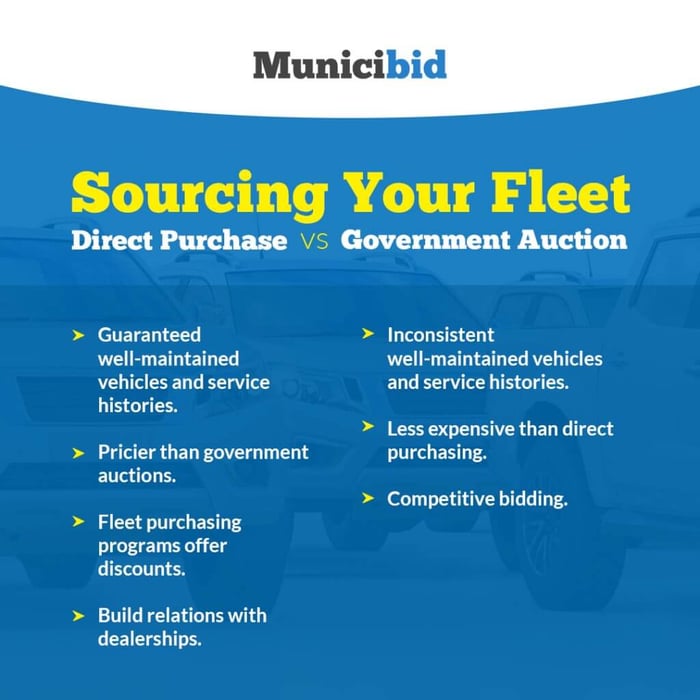
Insurance and Risk Management
One aspect of your business plan that is a non-negotiable is the comprehensive business insurance, including fleet insurance. This protects your business assets and even your personal assets in case of legal issues. There's always a degree of risk management associated with this line of work because drivers can be unpredictable. Aside from dents and scratches, there's always the possibility of renters totaling a car.
Location and Logistics
The location of your car rental business depends heavily on your target market. Proximity to airports, hotels, and business centers is often beneficial. Keep in mind that a physical location could also function as a pick-up/drop-off point for your car rentals, influencing the customer's convenience. The more convenience you offer, the more customers you retain and gain.
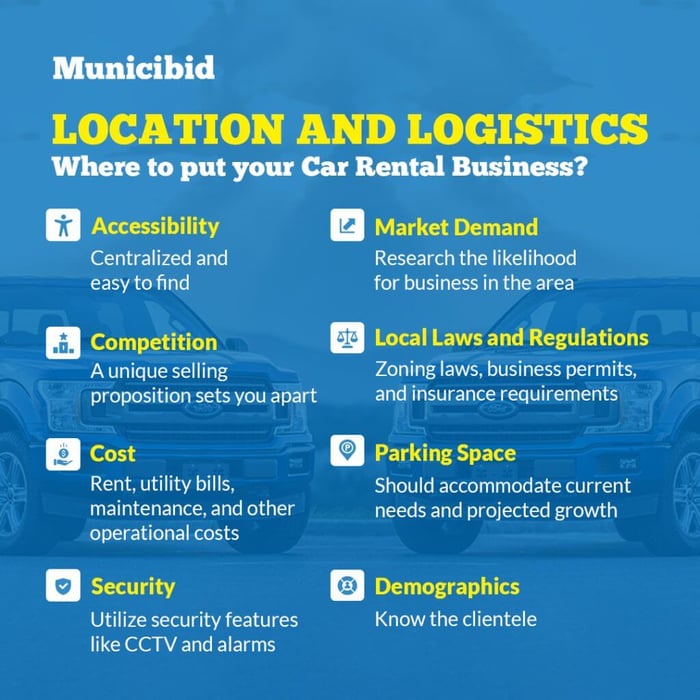
Accessibility
The location should be centralized and easy to find, preferably near airports, train stations, or major intersections. Likewise, situating yourself near well-known landmarks or busy shopping districts can bring walk-in customers. Being situated close to these can provide not just regular customers, but business partnerships as well.
Market Demand
Research the local market to ensure there's a demand for car rentals. Look at the number of travelers, types of businesses, and local events that might generate clientele. You can use surveys, market research data, and even competitor analysis for this.
Competition
Evaluate the level of competition in the area. An area saturated with car rental services will be more difficult to break into, although a unique selling proposition could set you apart.
Local Laws and Regulations
Each jurisdiction has its own set of regulations governing car rental services. This can include zoning laws, business permits, and insurance requirements. Make sure your business complies with these.
Cost
Assess the amount needed for setting up and running your business at the chosen location. This should include rent, utility bills, maintenance, and other operational costs. The site should be affordable enough to maintain while still offering the potential for good profit margins.
Parking Space
Sufficient space for the fleet is essential. Inadequate parking not only limits the size of your fleet, but also creates logistical problems. Similarly, make sure the location can accommodate both your current needs and projected growth.
Security
The safety of your fleet should be a priority. Locations that are well-lit, have security features like CCTV and alarms, and are located in low-crime areas are ideal.
Demographics
Take into account the demographics of the area. Are the people likely to require a rental car? Are they tourists, business travelers, or locals who might need a temporary vehicle?
Choosing a Business Structure
Creating a business plan for a car rental involves several key components:
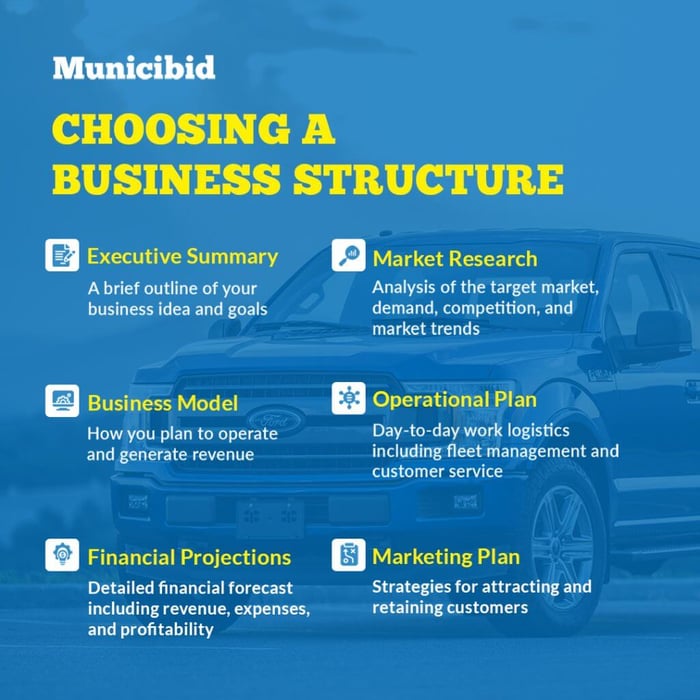
Executive Summary: a brief outline of your business idea and goals.
Market Research: analysis of the target market, demand, competition, and market trends.
Business Model: how you plan to operate and generate revenue.
Operational Plan: day-to-day work logistics including fleet management and customer service.
Financial Projections: detailed financial forecasts including revenue, expenses, and profitability.
Marketing Plan: strategies for attracting and retaining customers.
And when determining your business structure, your options are sole proprietorship, partnership, or a corporation. Consult with an attorney to understand which legal business entity offers the most relevant benefits. Don’t forget to register a business name, get a business license, and open a bank account for the organization. Moreover, your rental business will require specific permits, especially if you're operating near an airport or other regulated areas. These are all crucial for both legal compliance and building company credit.
Types of Car Rental Businesses
There are several pathways to venture into this line of work, each with its own unique set of advantages and challenges.
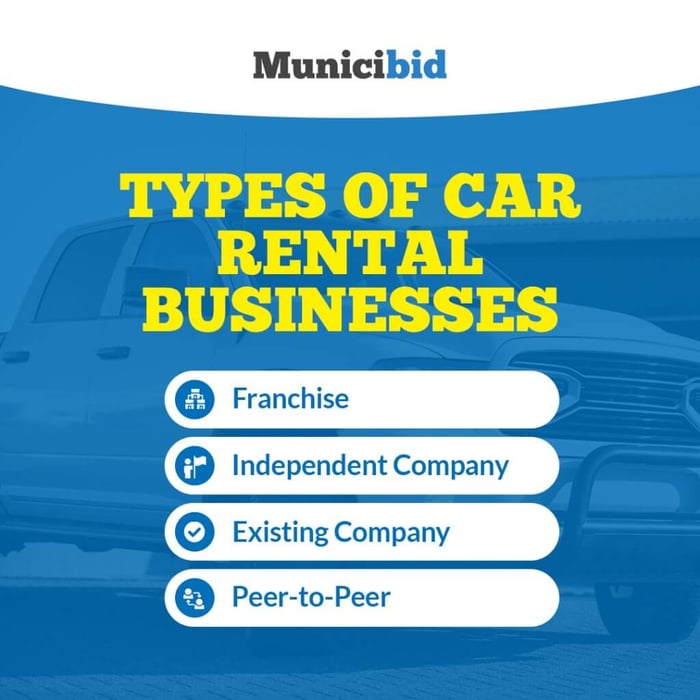
Franchise
Franchised car rental businesses offer the advantage of brand recognition. The initial franchise fee might be a considerable investment, but associating with an established brand could offer instant credibility and a ready customer base.
Moreover, being associated with an established brand means financial security throughout every down season and means an easier time finding loans. Most franchises also offer robust support systems, including training to navigate the competitive landscape of the industry. Their business model is often well-oiled, taking the guesswork out of many operational aspects.
Though, the franchising route is not without hurdles. The franchise fees are not the only initial costs. There are ongoing royalties that eat into profits and being part of a franchise system limits how much control you have over business decisions. You have to adhere strictly to the brand’s business model and guidelines.
Independent Company
Running your own car rental business gives you full control over operations and profits. As an entrepreneur, you have the freedom to make all decisions ranging from car fleet selection to implementing marketing strategies. This flexibility allows for quick adaptation to local market demands and trends. One of the great appeals of going independent is also the ability to offer localized services, catering to niche markets that large brands overlook.
However, this autonomy comes with a significant risk. As a newcomer, you're exposed to all the ups and downs of the market without the safety net that comes with an established brand name. Without the cushion of a franchise support system, operational tasks like securing a business bank account or getting an auto loan will prove more challenging.
Existing Company
Another option is to acquire an existing car rental business. This choice offers the unique advantage of stepping into a turnkey operation. An established company brings existing systems, staff, and potentially even an established customer base, offering immediate revenue streams. Such advantages often make it easier to secure business loans for the purchase. However, the initial cost can be prohibitively high, and there's always the risk of inheriting unknown liabilities or operational challenges. Transitioning from the old ownership and perhaps even a different business culture can also be a complex process requiring meticulous planning and execution.
Peer-to-Peer
Popularized by platforms like Turo, you can also enter the peer-to-peer car rental space. This model is particularly attractive for those looking for a side business or those who wish to start small, potentially even with a single car. The schedules are generally flexible, and many people appreciate the community aspect that these platforms provide.
"You create your listing after you create an account. And you take some photos of your car. You add a descriptiuon. You put in your address, and you've got a listing that's live on our app. We help you find the right price for your car, and we help you decide where your availability is.
"I've been [my car] on Toro for the last 5 years and I've roughly made ten thousand dollars a year by sharing it. My daily price is around $200 a day. People book it for a day, or two, or three, sometimes for longer trips."
Andre Haddad, Turo CEO
On the flip side, running your business on another platform means you're tied to their rules, fees, and success. The lower barriers to enter in the peer-to-peer model typically mean that the market is often saturated, which can drive down prices and profit margins.
Setting Up Operational Logistics
Once you have the keys to your rental vehicles and your financing in place, you need to consider the day-to-day running of your rental business. How will customers book your cars? Is the process streamlined on your website? Operational efficiency is key in retaining customers. Make sure your business model addresses vital operational aspects like vehicle maintenance schedules, booking software, and customer service channels.
Financial Health: Managing Business Accounts and Cash Flow
When managing the business bank account, you'll need to keep a keen eye on business expenses, taxes, and profits. Be sure to separate personal assets from the company. This protects you legally and also helps you build business credit. Also consider using accounting software tailored for small businesses. This will help you manage cash flows, debts, and profits more efficiently. As the company grows, you might even consider hiring a dedicated accountant.
Marketing and Branding
Your website serves as the storefront of your car rental business. Invest in a professional platform and consider implementing search engine optimization (SEO) strategies. This ensures that potential customers find your business when they search for car rental services online.
Social media accounts are another must. Platforms like Facebook and Instagram offer direct channels to your clientele. Run ad campaigns targeted to your market, share customer testimonials, and post updates about new additions to your car fleet.
Digital marketing is crucial for any new business, especially in the car rental industry where competition is fierce. Use social media accounts to engage with customers, share their testimonials, and offer special promotions. Moreover, ensure that your brand is unique and memorable.
Navigating the Competition: Standing Out in the Car Rental Market
The car rental industry is competitive, which means market research doesn't stop once your business is up and running. Keep updating your strategies according to market needs and customer feedback. Monitoring your competitors is essential too, not just for inspiration but to identify gaps in the market that your car rental business can fill.
Crafting a Stellar Customer Experience
Your business plan should also detail steps for developing customer service. From the first click onto your business website to returning car keys, the customer's journey should be seamless. Invest in a user-friendly website with excellent search engine optimization (SEO) to attract potential customers. Make the rental contract process straightforward, and always be transparent about the costs involved.
Ultimately, stellar customer service goes beyond making a sale. You want to create an environment where patrons prefer your car rental company over others. Implement a loyalty program or offer discounts to repeat customers. The car rental business depends on both acquiring new clients and retaining existing ones. Ask for feedback after each rental experience and make improvements based on reviews.
Diversification and Expansion: Growing Beyond Your Initial Vision
Once your car rental business is stable and profitable, consider diversification. Diversification is a common strategy used by successful car rental businesses to increase revenue streams. What the concept means is switching up the sorts of vehicles you provide and finding new services to offer. This could include shuttle services or forming partnerships with local hotels and travel agencies.
The Car Rental Industry: A Data-Driven Perspective
Here are several key statistics to keep in mind as you form your own car rental services or take over an existing business. Note that this data is not an indicator, but a guide to shape your own model, target the right market, and align your services to meet consumer needs.
Market Size and Growth
As of 2022, the global car rental market was estimated to be worth around $104 billion and is projected to grow at a CAGR of about 9.87% from 2023-2028. This underscores the immense potential the sector holds for both new and existing rental businesses.
Customer Demographics
Business travelers account for majority of the car rental market, which also indicates that younger adults comprise most of the customer base. The number of non-business travelers increases during summer months when couples, families, and other groups often take vacations.
Vehicle Preferences
Economy cars made up 35% of rented vehicles in 2022 and are expected to remain as such due to size and cost.
Online Booking Trends
Due to convenience coupled with the amount of options available through websites and phone apps, most car rentals are now initiated online.
Seasonal Variations
Data indicates that the summer months see a spike in rentals due to vacations and related traveling. This is when car rental prices reach their highest. Prices fall during other times, especially winter, when travel is less likely, with holidays being an exception.
Market Challenges
While the industry offers ample opportunity, challenges such as high operating costs, fleet maintenance, and competition from rideshare services persist. On average, expect to pay somewhere between $53-62K a month to run a small car rental business.
Regional Markets
In the United States, the car rental industry contributes to the economy with $54.2 billion in market size! Hotspot cities and states that experience the most business and tourism offer the greatest contributions to that figure.
Technology Adoption
As per various industry reports, many car rental companies now use some form of fleet management software, and some also employ AI-based customer service solutions.
Breaking Down Costs to Start a Car Rental Business
Below are the key finances involved with starting a car rental business, along with approximate price ranges. Note that these are estimates and that actually pricing will vary depending on initial funds, your location, and other factors.
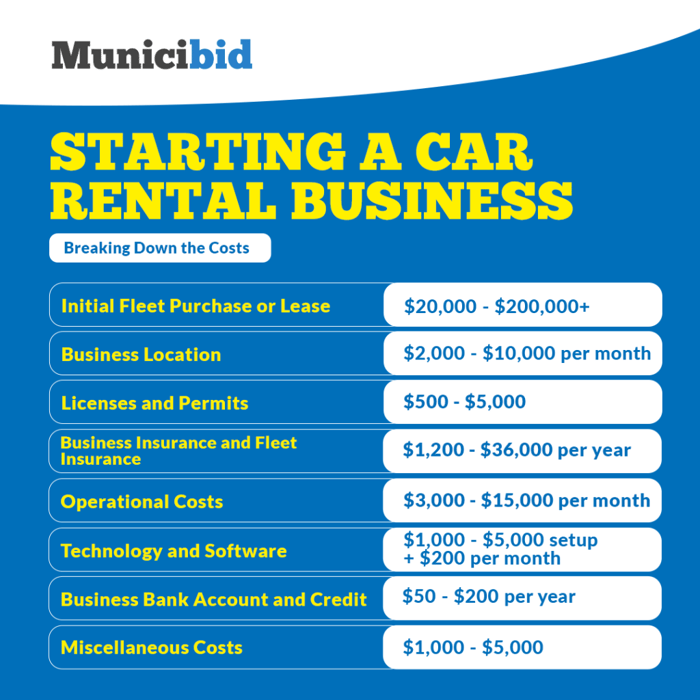
Initial Fleet Purchase or Lease: $20,000 - $200,000+
Whether you opt for brand-new, luxury cars, or used vehicles, expect to invest between $20,000 and $200,000 or more to acquire a respectable fleet. Alternatively, leasing vehicles could cost you anywhere from $300 to $



